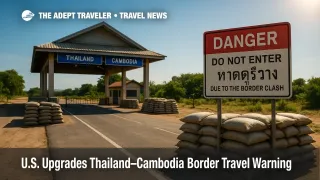U.S. Upgrades Thailand-Cambodia Border Travel Warning

The U.S. State Department on July 26 elevated its travel advisories for Cambodia and Thailand to Level 2: Exercise Increased Caution, citing deadly military clashes along their 500-mile frontier. Americans are now urged not to travel within 30 miles of the border, where artillery and rocket fire have killed at least 32 people and displaced more than 150,000 residents. Martial law on the Thai side and mass evacuations in Cambodia underscore rising security risks for travelers.
Key Points
- Why it matters: The new warning tightens restrictions for two of Southeast Asia's most-visited countries, affecting flight routings and overland tours.
- Level 4 "Do Not Travel" zone extends 30 miles deep on both sides of the border.
- Fighting has claimed 32 lives and forced over 150,000 people from their homes.
- Thailand imposed martial law in eight districts; Cambodia calls for an immediate cease-fire.
- U.S. consular assistance is extremely limited inside the exclusion zone.
Snapshot
Travelers planning overland trips between Bangkok, Pattaya, or Siem Reap and the frontier must now reroute via air or coastal highways far from contested areas. Checkpoints near Poipet, Aranyaprathet, and lesser-used crossings may close without notice, and commercial insurance often excludes coverage for active-conflict zones. Airlines continue normal schedules to Bangkok-Suvarnabhumi and Phnom Penh International, but carriers could reroute or cancel flights if hostilities intensify. Enroll in STEP alerts, monitor local media, and maintain backup exit plans.
Background
Thailand and Cambodia have feuded over land surrounding ancient Khmer temples since the early 1900s, with major flare-ups in 2003, 2011, and 2023. A land-mine blast that wounded Thai troops on July 24 reignited hostilities, triggering artillery duels across multiple border sectors. Adept Traveler first flagged the danger in its July 24 advisory, and our newsroom has tracked each escalation since. Travelers should note that prior civil-unrest hot spots in southern Thailand are unrelated to this northern frontier fighting.
Latest Developments
Thai Martial Law Tightens Controls
Bangkok placed eight Chanthaburi and Trat districts under martial law, empowering the military to impose curfews, search vehicles, and close roads without civilian oversight. Checkpoints have expanded vehicle inspections, and authorities warn that drone use and photography near military positions are banned. Thai officials accuse Cambodian forces of firing rockets at populated villages, while Phnom Penh claims Thai airstrikes damaged Buddhist sites. Third-party mediation offers from ASEAN and the United States remain stalled.
Casualties and Displacements Mount
Health ministries on both sides now confirm 32 fatalities-19 in Thailand, 13 in Cambodia-and more than 150,000 evacuees housed in schools and sports arenas. Relief agencies report shortages of potable water and medical supplies, and intermittent shelling hampers convoy movement. The UN Security Council scheduled an emergency session for July 27, warning that historical grievances and nationalist rhetoric could push the clash into a wider conflict.
Analysis
Washington's advisory shift signals a rare mid-summer shock to Southeast Asian tourism. July typically marks the start of peak inbound demand from North America, but a Level 2 notice often triggers corporate travel-risk reviews, higher insurance premiums, and paused group itineraries. The carve-out Level 4 zone, spanning Thap Phraya to Oddar Meanchey, directly intersects overland backpacker routes and freight corridors linking Bangkok to Siem Reap and Ho Chi Minh City. If shelling reaches major highways or rail lines, airlines could face crew-routing challenges, raising fares on already-tight Trans-Pacific capacity. Conversely, destinations far from the border-Phuket, Chiang Mai, Angkor Wat, and Sihanoukville-remain outside the exclusion zone, offering operators avenues to redirect tours. Geo-politically, prolonged skirmishes would test ASEAN's conflict-resolution credibility and could invite external mediation by China or the United States. Investors will watch for disruptions to Thailand's Eastern Economic Corridor and Cambodia's garment exports, both reliant on cross-border logistics.
Final Thoughts
While Bangkok and Phnom Penh remain safe for routine travel, the volatile border zone now carries the U.S. government's strongest warning. Travelers should monitor official updates, ensure evacuation clauses in insurance policies, and avoid non-essential trips near the frontier until stability returns to the Thailand-Cambodia border travel advisory.
